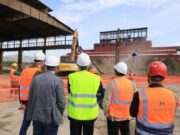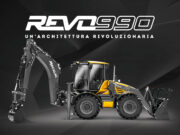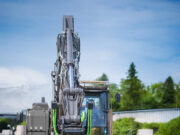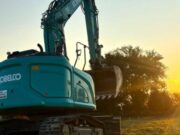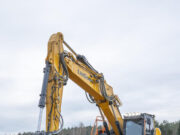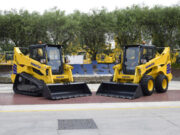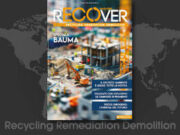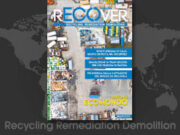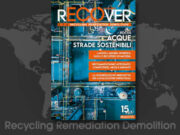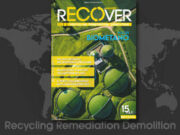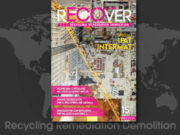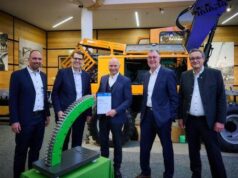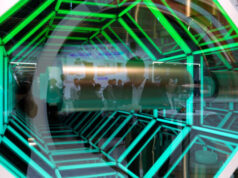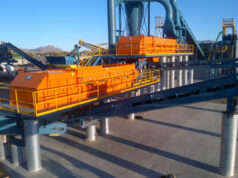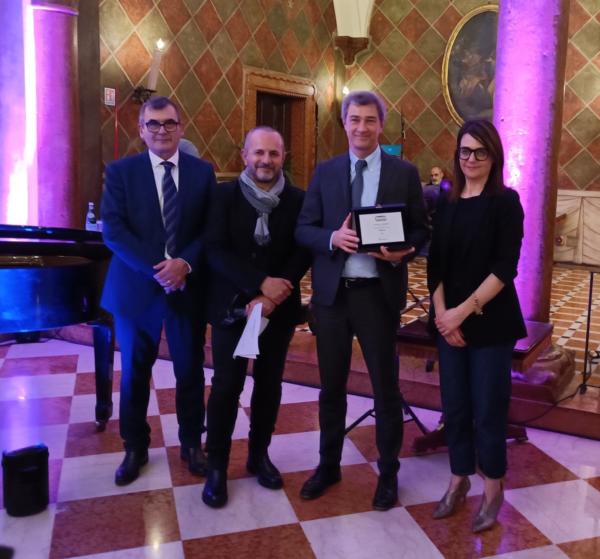
The telehandler awarded for ‘the original and functional solution focused on safety and comfort’. Highlights include the unique CS suspended cab
Merlo’s 30.7 telehandler is one of the winners of the SaMoTer Innovation Award, the prize for innovation promoted by the International Construction Machinery Exhibition that enhances the technical and constructive evolution of mechanical construction equipment. The 30.7 won in the Telehandler | Compact category for ‘the original and functional solution focused on safety and comfort’.
The 30.7 compact Telehandler was conceived and created on the concept of raising safety standards in its category and, for this reason, it is equipped with a series of systems that make it totally unique.
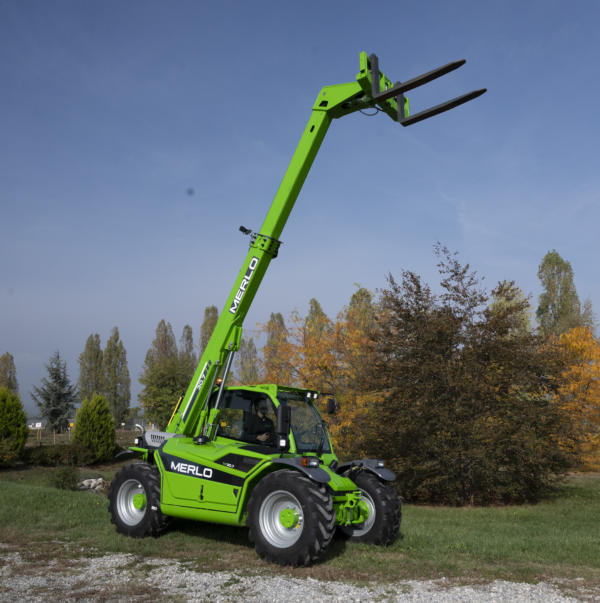
Merlo’s ASCS (Adaptive Stability Control System)prevents risk of the machine tipping over while handling a load.
The Merlo Active Personnel Safety system, with its wide-angle lens cameras, provides the operator with a view of the side and rear areas and human presence detection. The 30.7 can also be equipped with 360° LED lighting, which allows optimal visibility in all light conditions. The standard version of the 30.7 is also equipped with a system called MerloMobility 1.1, which provides real-time monitoring of machine functions, making it possible, among other things, to limit or programme the functions of the telehandler according to operational or safety requirements.
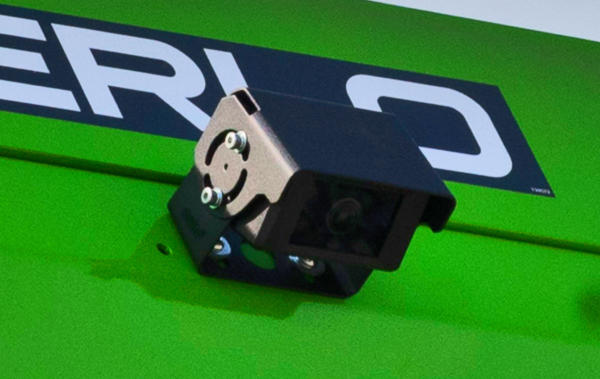
One of the key strengths of the 30.7 is that it can be equipped with the exclusive Suspended Cab (CS) system, a technological solution patented by Merlo that maximises comfort and ensures a new standard of safety. The low frequency system, in fact, allows the drastic reduction of vibrations inside the passenger compartment and facilitates the absorption of the stress transmitted during the transfer and work phases, even on uneven ground. This increases the safety levels for operators and reduces the risk of accidents or the development of occupational diseases related to this issue.
A hundred years of history looking towards the future with confidence
The increasingly green business plan aims to exceed 10000 telehandlers per year and to develop new machines with zero fuel consumption, zero noise and vibrations, zero emissions.
The Merlo Group is specialised in the production of telescopic boom handlers, both fixed and with rotating turret, self-loading concrete mixers, forestry tractors and tracked vehicles. As certified by Unioncamere, the beginning of the Merlo family’s entrepreneurial activity dates back to 1911. This date places it in the narrow circle of the centenary companies that have made history in Italy. The first company in Europe to industrially manufacture the telehandler, Merlo took its first steps in the construction and industrial sectors and later its equipment was also used in the agricultural sector. Awarded worldwide for its numerous patents, Merlo is based in San Defendente di Cervasca (Cuneo, Italy), where the plant covers an area of approximately 350,000 m². Today the presence of the Merlo Group (which includes 9 specialised in-house companies) is guaranteed by a direct organisation of six branches (in France, Germany, England, Spain, Poland and Australia), by a distribution network of over 80 importers and 600 dealers, offering widespread coverage in terms of sales, service and spare parts.
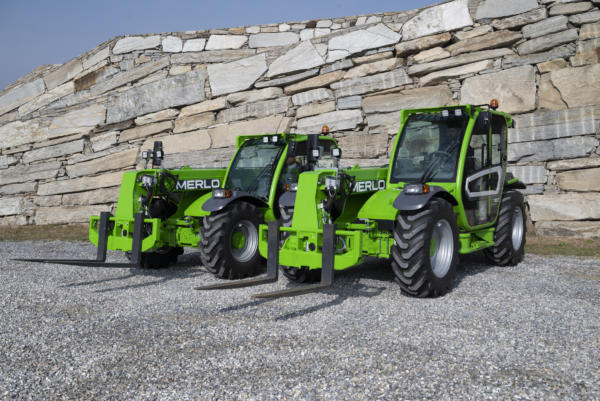
The business plan
At the end of 2021, Merlo launched e-WORKER, the first full-electric telehandler produced by the company, intended to achieve zero environmental impact and designed to significantly improve manoeuvrability, comfort and fields of application. The e-WORKER is the result of the company’s industrial growth plan for the four-year period 2018-2021, characterised by a series of key investments in quality and productivity, which in 2022 brought the total number of employees to 1626 (+32% in five years) and the total number of machines sold to 8400, 80% of which abroad).
Today, the 2022-2025 industrial plan continues in the vein of “innovators by tradition” that has characterised the company’s history, with the goal of increasing production capacity to 10 thousand telehandlers per year (plus 25 thousand accessories) and improving all the solutions available to customers, from after-sales to advanced telemetry and spare parts. In order to achieve these goals, Merlo has planned significant investments to open new production lines, including one dedicated to the e-WORKER. Investments will concern both personnel and new infrastructures, which will lay the foundations for the development, on an electric basis, of other machines in the Merlo range with the common philosophy of achieving zero fuel consumption, zero noise and vibrations, and zero emissions. The plan includes also the final transition to Stage V engines for the entire product range (Telehandlers, Cingo and TreEmme). The assembly and cab creation areas will be thoroughly redesigned, as will the assembly and painting lines. The cab welding area will be fully automated and, in this context towards Factory 4.0, deep changes will also affect logistics, with even special management software integrated with suppliers.
New products and a factory redesigned in terms of production processes and logistics are going hand in hand with increasingly sustainable production, which is also the focus of attention in the 2022-2025 plan. Over the last three years, solar panels totalling 747 kW have been installed on the roofs of the group’s companies (Merlo Spa, Tecno and TreEmme). In the new production areas, insulation has been improved to minimise energy losses. The reduction of Merlo’s environmental impact is also pursued by introducing more than 30 cardboard/plastic compacting presses, which, together with chip and sheet metal recovery policies, will considerably facilitate the recycling of all waste materials. To reduce energy waste, home automation is being increasingly used in the new Merlo buildings, with the aim of optimising light and heating consumption. To complete this process, the Merlo Group has also implemented a gradual revamping of its production equipment with more efficient solutions in terms of energy, consumption and transport time.









